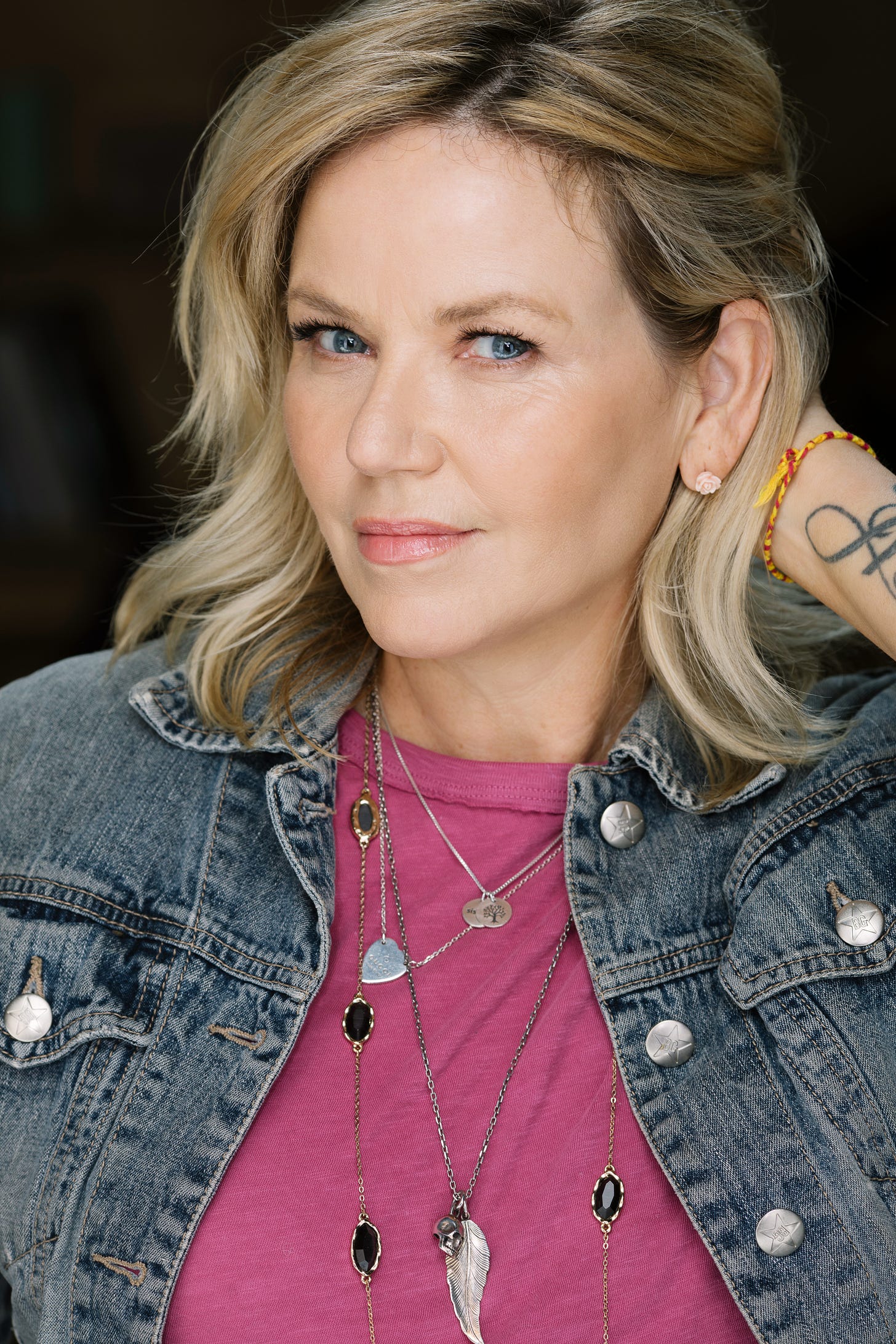CR 015: Kay Hanley on Her Extraordinary Career
The Letters to Cleo frontwoman and Emmy Award-winning songwriter discusses her path from rock stardom to children’s television.
It sounds like the plot of a made-for-TV movie: A one-hit wonder rock star leaves her hometown for Hollywood and goes on to win an Emmy for her work on an animated TV show produced by a beloved former U.S. president. And yet, it’s a pretty good summary of singer-songwriter Kay Hanley’s remarkable career path.
In 1994, the Dorchester, Massachusetts native and Letters to Cleo frontwoman became an alt-rock darling when “Here and Now,” a single from the band’s debut album, charted on the Billboard Hot 100. Music videos, tours, TV and film appearances, and two more albums followed before Letters to Cleo disbanded in 2000. Soon after, Hanley provided the singing vocals for Rachel Leigh Cook’s Josie in the live-action adaptation of Josie and the Pussycats. There were additional soundtrack contributions, TV appearances (including NBC’s Parks and Recreation), and solo albums and EPs. And then, in 2012, her career pivoted to children’s television.
For over a decade, Hanley has composed original music for numerous animated series, including Doc McStuffins, Harvey Girls Forever!, DC Super Hero Girls: Sweet Justice, Vampirina, and Ada Twist, Scientist. Her work on We the People, which was executive produced by Barack and Michelle Obama, earned her an Emmy Award. And on September 3rd, Hanley’s latest passion project, Kindergarten: The Musical, will premiere on Disney Jr. (and the following day will premiere on Disney+). As she shared on Instagram, the show—which she and her longtime songwriting partners, Michelle Lewis and Dan Petty, worked on for more than three years—is a love letter to kindergarten teachers and their students.
Though she never could have imagined that her early days in the indie rock scene would lead her to where she is today, Hanley is quick to point out that she will forever be grateful for Letters to Cleo’s enduring legacy. “Our band had one hit,” she says. “And because of that one hit, to this day, people still take my phone calls. So don’t ever shit on one-hit wonders, because you can really make a career out of it or get to where you want to be.”
Over a recent Zoom call, Hanley and I connected over our shared hometown of Dorchester, while chatting about her work in TV, the Josie and the Pussycat soundtrack, and her musical influences.
SANDRA EBEJER: You’ve been doing some live shows with Letters to Cleo in honor of the 30th anniversary of the band’s debut album, Aurora Gory Alice. How has it been?
KAY HANLEY: Amazing. We started doing those last year. We did the album in its entirety, which was interesting, because we hadn’t played a lot of those songs from that album in 28 years. And just to revisit the songs that I thought I didn’t like—I just had a whole new appreciation for 22-year-old me writing lyrics, really feeling my way through who I am as a lyricist and melody writer and having a new appreciation for [the music]. Like, wow, we were pretty good at this, even then. I didn’t have a sense of that at all at the time.
When you guys started out, there was no social media, there was no Internet, there were no cell phones. Have you noticed a difference in the way that the audience interacts with you, given that we’re in a very different time?
Oh my gosh. It’s so funny that you say that. Just last week on Twitter—I’m still on Twitter, I just can’t give it up. There’s this account called 120 Revisited. I love it. They post all the 120 Minutes videos. They posted a video of our appearance on Beavis and Butt-head. And I was remembering how it was 1994, I think, or ‘95. We were on tour with no cell phone, no Internet, we were advancing all of our shows from a payphone on the way the day before the gig. So we did not even find out that we were on Beavis and Butt-head until we got to the venue the next day for soundcheck and fans were like, “Beavis and Butt-head was awesome!” We were like, “Excuse me? What?” [Laughs] So [we learned about it] a full 24 hours later.
[Now], everything is so instant. I really appreciate being able to promote shows on Instagram and having control over my own promotion, my own destiny, and not have it be completely in someone else’s hands how I’m presented. But at the same time, as a performer, it’s distracting to have people in the front row pointing up at me [with a camera]. No person wants to be photographed like that. I don’t want to be the audience’s mom. I don’t mind if people take pictures or take a video, but if someone is just camped out in front taking video or live streaming, I’ve found myself being kind of a scold.
Who were some of your influences back when you guys were first starting out? Were there any musicians or bands you really looked up to?
Greg McKenna [Letters to Cleo’s guitarist] and I are distant cousins from Dorchester, and we knew each other as teenagers. He asked me, initially, to be the backup singer in his band. So that’s what I was, until I started learning how to write songs a few years later. In that band we were really into ska. We were really into English Beat and Bim Skala Bim and the [Mighty Mighty] Bosstones. We had a lot of ska influence, weirdly. [Laughs] I’m glad there are no videos of that.
When I started writing songs a big influence for me was Michael Stipe. I loved how he was able to convey a feeling without being literal. He never used “I.” Everything was creating a scene or a metaphor. And being an Irish Catholic girl from Dorchester, my feelings are very embarrassing to me, and I don’t want anybody to know anything that I’m thinking or feeling, so that was a great way to express myself in those early days. I still have a tendency to do that in my artist life. I write for television now, so I have to be extremely literal, but in my artist life, I still prefer to put up the veil of allegory.
You’ve had appearances in and made contributions to numerous film and TV projects. One of the biggest is probably Josie and the Pussycats. How did that film and its soundtrack change the trajectory of your career?
It did in ways that you wouldn’t think and then it didn’t in the ways that you would. It was a major motion picture. The soundtrack was very well [received]. I got my first good review in the Village Voice. I’ll never forget it as long as I live. I was like, “Holy shit. The Village Voice finally likes me!” It was the first time I made money from singing.
But the real way it changed me was working with Babyface in L.A. He just got up in the morning, and as soon as he sat up in bed, he was a creator. He was creating music. That’s all he did; that’s all he thought about. But he also had complete control over his business, and I had never seen that before. I had never seen somebody who did both—was able to be a truly creative person from sun-up to sundown, and also be a businessperson, where you do work on a job and someone pays you. I’d never seen that. I had never been paid a royalty on a Letters to Cleo record—I still haven’t—so it really was instrumental in showing me how that could be done, and that was what I really wanted.
How did your work in children’s television come about?
Well, we finally made the move to L.A. and shortly after moving here, my friend Nina [Gordon] from Veruca Salt was working with another friend, Tracy Bonham, and this woman named Michelle Lewis on this songwriting project. Tracy had to leave to go do Blue Man Group or something, so Nina said to Michelle, “My friend Kay just moved here. We should have her come in.” So anyway, long story short, Michelle and I met, and—have you ever just met somebody where creatively you were just like, whoosh? Like it’s just a creative explosion? That’s what it was like. So we started coming up with these ideas for what we called “cockamamie schemes,” and a couple of our cockamamie schemes were ideas for TV shows. We actually called Disney. We called up the VP of programming at Disney and we were like, “Hey, we have an idea for a show.” We didn’t know that you’re not supposed to do that. [Laughs] And weirdly, they were like, “Alright, come on in.”
Michelle and I started writing these ideas for TV shows. We went into Disney with the premise and the songs on a CD from the segments that we had created, and we would play the theme song live in the room. We ended up selling two shows that way. Neither one of them went anywhere, but it did establish us within the company as people who could do this kind of work. So when Doc McStuffins was greenlit, they were having trouble with the music, and one of the executives from Disney called and said, “We have this new show. It’s going to pilot. Can you guys come in and consult on the project?” And we were like, ooh, consulting! That sounds so grown up! “Yes, we’ll be consultants!” I’m shopping for a fucking suit and a briefcase... [Laughs] Anyway, we went in, and we met with the creator, Chris Nee, and two weeks later, we had a deal to be the series composers. We’ve been doing that ever since. That was in 2010.
That’s awesome! When you’re writing a song for a television show, what is the process? How do you ensure that the song matches the tone or vision for the show?
That’s a great question, and it’s my favorite question, because writing for script, to me, is the ultimate in creative freedom. When I’m writing for myself, like I was telling you earlier, I’m embarrassed about my feelings or what I’m saying. I’m very guarded about everything, and it gums up the creative process for me. When I have a script and I’m working in the service of a different creative vision, a song is just a part of it. It’s like, the characters are doing this, the story is about this, the song goes here, it has to connect this part of the story to this part of the story—my ego is completely extricated from the process, and I can be purely creative. It has nothing to do with me. It’s not reflecting on me. I love it. This is what my creative brain was born to do, work in script.
What is your process as a songwriter? Do you enjoy writing lyrics more than music? Do you find that one is easier than the other?
Wow! I’ve never been asked that question. The way I started writing songs was Greg came into rehearsal one day—this was when I was the backup singer in Letters to Cleo. I didn’t write; he wrote all the songs. We came into rehearsal early one day, and he had written lyrics for a new song. I was looking at the lyrics and he started playing this guitar bit, and all of a sudden, I had this melody form in my head. The melody was really coming together. I’m looking at the lyrics and singing the melody with these lyrics that he had given me, and me and Greg are just looking at each other, like, Oh my God, what is happening right now? It was the most amazing thing. I had no idea that I could do that. It never occurred to me to even try to do that.
Lyrics? I really trust my melodic brain. I mean, I can come up with a melody off the top of my head right now and just trust it. But lyrics I’m much more discerning about. I think I’m harder on myself about lyrics.
You recently did a songwriting workshop through American Songwriter. What advice do you offer to aspiring songwriters?
My friend Shelly Peiken is a songwriter, and Shelly says, “Dare to suck.” I admire that advice so much, because there’s a tendency with songwriting, and probably for your kind of writing as well, to edit as you go. My process is really about [sings], “La la la la la.” I will “la la la” out an entire arrangement for a song and just put in dummy lyrics. Even if it’s just like “clothes hanger, tree,” whatever—the lyrics will come, and I will just allow them to come and edit later. Because if I’m editing as I go, melodically or lyrically, I’m focusing on the wrong task. Also, dare to suck in front of other people. I’m a dyed-in-the-wool collaborator. I’ve always been a co-writer. Not to say that I don’t ever write by myself. I do. But historically, I love writing with other people, and daring to suck in front of other people, that takes confidence. [Laughs]
And you have to do it, you can’t learn it. It’s never comfortable. Just throw out your most impulsive ideas. I think writing benefits from impulsivity. The other thing that is really important to me as a listener is authenticity. I can tell if you’re full of shit or not, and when something is coming from a personal experience or coming from someone’s guts, I feel that and I aspire to that. I want to give that back. That’s my ideal. So, don’t think just because you’re being clever that you’re getting inside someone’s heart. You’re not. Sometimes cleverness is the enemy of awesomeness.
To learn more about Kay Hanley, visit her website.
This interview has been edited for clarity and length.
You might also enjoy…








